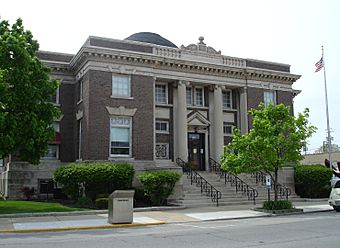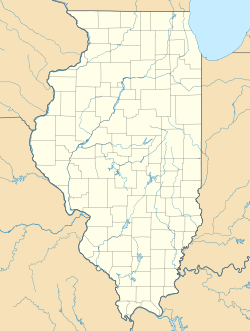Streator Public Library facts for kids
Quick facts for kids |
|
|
Streator Public Library
|
|
 |
|
| Location | 130 S. Park St., Streator, Illinois |
|---|---|
| Area | less than one acre |
| Built | 1903 |
| Architect | Patton & Miller |
| Architectural style | Classical Revival |
| MPS | Illinois Carnegie Libraries MPS |
| NRHP reference No. | 96000512 |
| Added to NRHP | May 2, 1996 |
The Streator Public Library is a special old building in Streator, Illinois. It's located at 130 S. Park Street. This library opened in 1903 and was the first real home for books in Streator. It's a type of library called a Carnegie library, named after a famous person who helped build many libraries. The building was designed by architects Patton & Miller in a style called Classical Revival. Today, it's still the main public library in Streator and is even listed on the National Register of Historic Places because of its importance.
A Look Back: Library History
Streator had a library group called the Streator Library Association from 1871 to 1875. They kept their books in different local shops. When that group stopped, the Ladies Library Association started in 1876. They moved their books around to various community spots. Eventually, they found a home in the Plumb Opera House.
The owner of the opera house, Ralph Plumb, was a friend of Andrew Carnegie. Andrew Carnegie was a very rich man who loved to help communities build libraries. When Carnegie started his library program, Ralph Plumb asked him for money for Streator's library. Carnegie gave the community $35,000, which was a lot of money back then! It was one of the biggest amounts he gave for a library.
Work on the new library building started in 1902. The doors officially opened to the public on January 31, 1903. This beautiful building was added to the National Register of Historic Places on May 2, 1996, recognizing its historical value.
Building Style: Classical Revival
The Streator Public Library was designed by architects Patton & Miller from Chicago. They used a style called Classical Revival. This style looks like old Greek and Roman buildings.
At the front entrance, you'll see two tall columns on each side. Above the entrance is a triangular shape called a pediment. Around the whole building, there's a decorative band made of terra cotta. This band includes a cornice (a fancy molding) with small block-like shapes called modillions and a pattern called fretwork. Below that is a frieze, which is a flat panel section.
Above the roof line, there's a brick wall called a parapet with a detailed terra cotta panel at the front. A round dome sits on top of the roof. Inside the library, there's a two-story open space called a rotunda. On the first floor of the rotunda, you'll see more columns. On the second floor, there are special paintings, or murals, of famous thinkers like William Shakespeare, Henry Wadsworth Longfellow, and Socrates.
 | Precious Adams |
 | Lauren Anderson |
 | Janet Collins |



